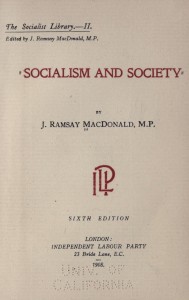George Gregory (b.1888): Politics and Protest
George grew up in a way that limited his world-view. He was born in the late 19th Century into a working class family in a mining village, and was effectively presented with a path to follow. He was most certainly a part of a working class collective, and recognises this as he says, in hindsight, ‘I considered myself belonging to a whole situation rather than as one who was emerging from it in the pursuit of ends’ (60).
However, things began to change in British politics as the 1900’s dawned, specifically for the working-class. The period up until the beginning of the Great War is renowned for ‘great waves of trade union expansion, the growth of socialism, the foundation of the labour party… the demand for social reform and the beginning of the welfare state’ (Jones, 461). The effects of these changes are not lost on George, and they had a large impact on the course of his life.
He recalls ‘reading Macdonald’s book on socialism to find out what the new teaching was’ (89), and he became involved, both mentally and physically, in the socialist movement. At the age of 23 (1911 or 1912, depending on when in the year George’s birthday fell), he ‘made a speech on Socialism at a public meeting in the schoolroom in the village’ (89). George was involved in the growth of the Socialist movement as it began to gain traction in England. He advocated it long before the first Labour government was in power in 1924.

George’s autobiography offers a great insight into the political thoughts that were rife amongst the British working class in the early 20th Century. He talks about how, at the close of the Victorian Era, there were two main parties who took turn in office – the Liberals and the Tories. He describes the general feelings his social peers had towards the latter:
to be known as a Tory was the way to alienation from the working class… I recall one man who was a Tory because he held an official position… other men saw him only as a ‘bosses man’ who had gone over to their side. They were thought of as being interested in profit and interest as compared with Liberals who stood for Free Trade (87)
Running parallel to the unthinking hatred of the Tories was an equally unthinking respect and loyalty for Liberals. George’s local MP ‘was rich, and his wife displayed her jewellery without reserve when she appeared on the platform with her husband’, but he recounts with disapproval how ‘no one seemed to mind, for they were Liberals and most favourable to the workers. It was a case of man and not system’ (85). George is objective and fair with his memory of political thought, as always, which makes him ideal as a subject to use as research.

Although George was interested in politics and governmental economics, he never pursued a political career. Instead he contributed to his immediate area in a way that was more easily noticed. He held membership in numerous different societies that spread the word of Socialism and tried to make life fairer for the working class. It’s not an unfair claim to say that George played a part (no matter how small) in establishing the welfare state that we now can benefit from.
Gregory, George, ‘Untitled’, Burnett Archive of Working Class Autobiography, University of Brunel Library, Special Collection, 1:283.
Jones, Gareth. ‘Working-Class Culture and Working-Class Politics in London, 1870-1900; Notes on the Remaking of a Working Class’, Journal of Social History 7.4 (Summer, 1974): 460-508.

Leave a Reply